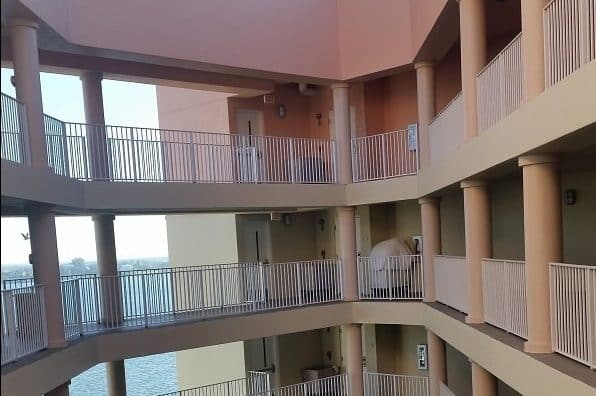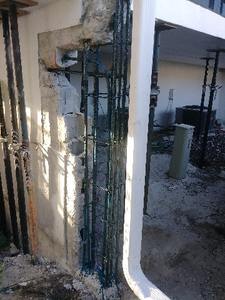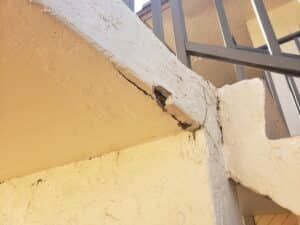McLeod’s Contracting Solutions, certified and insured Florida General Contractors, specialize in providing a variety of essential services to Condo-HOA and commercial property owners and managers. These services include concrete and stucco restoration, commercial high-rise painting, window and door replacement, and EFIS foam trim repairs. As experts in the field, we are committed to offering educational, informative, and unique content to help our clients make informed decisions and properly maintain their properties.
In this blog article, we will focus on the fundamental aspects of waterproofing and sealants in safeguarding Condo-HOA and commercial properties from water damage and the associated lasting effects. Water infiltration can lead to a myriad of problems, such as structural damage, mold growth, and reduced property value. Thus, it is crucial to understand the different waterproofing methods, sealant types, and the benefits of professional application to ensure the longevity and integrity of your property.
Contact McLeod’s Contracting Solutions for exceptional waterproofing and sealant services for your Condo-HOA or commercial property. Our certified and insured professionals offer expert advice and tailored solutions that cater to your specific needs. Schedule a free consultation with us today and ensure the long-term protection and value of your property.
Identifying Signs of Water Damage
Early detection of water infiltration is essential for mitigating extensive damage to your Condo-HOA or commercial property. Being able to recognize the signs of water damage can help you take prompt action and avoid costly repairs. Some common indicators include:
1. Efflorescence: This white, powdery residue forms on the surface of concrete, brick, and stucco as a result of water evaporation, leaving behind dissolved salts and minerals. Efflorescence is often an indication of moisture penetration within your building’s structure.
2. Mold Growth: Persistent dampness encourages the growth of mold, a hazardous fungus that can cause respiratory issues and adversely affect your property’s indoor air quality. Mold is often visible on walls and ceilings, appearing as dark spots or patches.
3. Structural Issues: Water infiltration can weaken your building’s structural integrity, leading to cracks in the foundation, walls, and ceilings. These issues can escalate over time, compromising your building’s safety and leading to expensive repairs.
Different Waterproofing Methods
There are various waterproofing techniques suitable for Condo-HOA and commercial properties to protect against moisture infiltration:
1. Liquid-Applied Membranes: These protective films consist of specially formulated liquid coatings that cure into a seamless, water-resistant barrier. Liquid-applied membranes are versatile, offering easy application on both horizontal and vertical surfaces, and are compatible with numerous substrates, such as concrete, metal, and masonry.
2. Sheet Membranes: Made from materials such as bitumen, rubber, and PVC, sheet membranes provide a continuous, durable barrier against water penetration. They are typically applied to large surface areas and require professional installation to ensure proper sealing at overlaps and joints.
3. Cementitious Waterproofing: This cost-effective method involves mixing a cement-based compound with water to create a waterproof coating. Cementitious waterproofing products are ideal for areas exposed to high levels of moisture, such as basements, foundations, and bathrooms.
4. Bentonite Clay Systems: Bentonite, a natural clay with exceptional swelling properties, forms a protective barrier when wet, preventing water from infiltrating your property. Bentonite systems can be applied as waterproofing panels or injected into the ground, making them suitable for foundation and landscape applications.
Types of Sealants
Sealants play a crucial role in waterproofing by sealing gaps and joints where water may enter. Selecting the appropriate sealant requires considering the specific application and properties of each sealant type:
1. Silicone: Highly flexible and resistant to UV exposure, silicone sealants offer excellent durability and adhesion to a variety of substrates. They are ideal for sealing building joints, windows, and doors, as well as compatible with glass and non-porous surfaces.
2. Polyurethane: These versatile sealants bond well to most building materials, such as wood, concrete, and metal. With their superior resistance to abrasion and impact, polyurethane sealants are an excellent choice for high-traffic areas and applications where flexibility and movement are required.
3. Acrylic: Acrylic sealants are water-based and easy to apply, providing a paintable and weather-resistant finish. They are suitable for sealing gaps in masonry, stucco, and plaster surfaces; however, they may not be as durable or flexible as their silicone or polyurethane counterparts.
Benefits of Professional Waterproofing Services
Hiring a professional contractor for your waterproofing and sealant needs can ensure a comprehensive, durable, and cost-effective solution for your Condo-HOA or commercial property:
1. Expertise and Knowledge: Professional waterproofing contractors possess an in-depth understanding of waterproofing methods, sealant types, and industry standards. Their experience enables them to recommend the most appropriate solution for your property’s unique requirements and challenges.
2. Quality of Work: Trained professionals can provide the highest quality of workmanship, ensuring that waterproofing and sealing are carried out correctly to protect your property. Proper application ensures the longevity of your investment and reduces the risk of premature failure and expensive repairs.
3. Warranty and Support: A reputable contractor will typically offer warranties on their work and stand behind their service, providing you with peace of mind and ongoing support in the event of any issues.
4. Efficient Project Management: Professional contractors have the necessary resources and expertise to coordinate and execute your waterproofing project efficiently, minimizing disruptions to property occupants and ultimately saving you time and money.
Conclusion
Understanding the importance of waterproofing and sealants in the protection of your Condo-HOA or commercial property is crucial in preventing water damage and its long-lasting effects. By recognizing the signs of water infiltration, exploring various waterproofing methods, and learning about the different types of sealants, property owners and managers can make informed decisions to ensure their property’s structural integrity and longevity. Reach out to a reputable waterproofing contractor like McLeod’s Contracting Solutions for expert advice and tailored waterproofing solutions designed to meet your specific needs. Schedule a free consultation today and protect the long-term value of your property with our exceptional waterproofing and sealant services.







